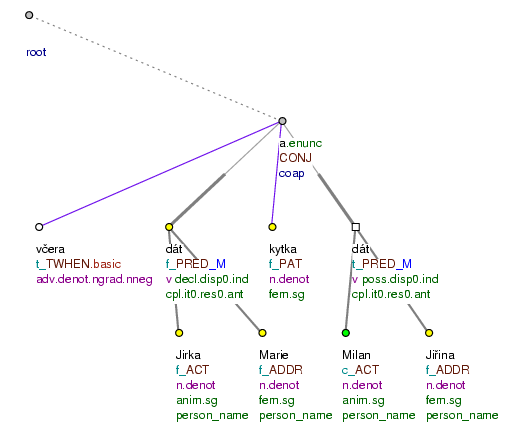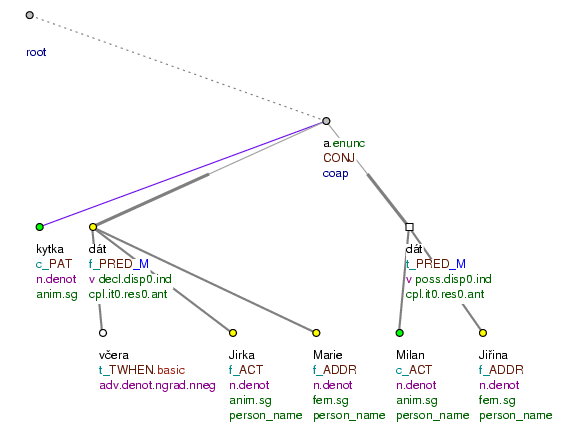Ellipsis of the governing and dependent elements is especially common in paratactic structures. Inserting new nodes for the governing expressions - if they are omitted - follows the rules in Section 12.1, "Ellipsis of the governing element".
The insertion of non-expressed obligatory modifications of coordinated elements follows the rules in Section 12.2.1, "Ellipsis of an obligatory modification", or the rules on shared modification (see Section 6.1.1, "Shared modifier of paratactically connected elements"); the latter rules (i.e. interpreting the structure in terms of shared modification) are to be preferred.
Obligatory modifications are thus usually represented with the help of the rules on shared modifications rather than by inserting new nodes with t-lemma substitutes. Therefore, it is usually not necessary to insert a new node into the tectogrammatical tree. Cf.:
-
Jirka dárek nejen vyrobil, ale i pěkně zabalil. (it. George the_present not_only made, but also nicely wrapped)
= Jirka dárek nejen vyrobil, ale Jirka dárek i pěkně zabalil. (=lit. George the_present not_only made, but George the_present also nicely wrapped.)
Both the obligatory Actor and Patient of the verb zabalit (=to wrap) are subject to textual ellipsis in the second clause. But as the expressed Actor Jirka (=George) and the expressed Patient dárek (=present) can be represented as shared modifiers of both the verbs vyrobit (=to create) and zabalit (=to wrap), no new nodes representing the omitted dependent modifications will be insterted into the tectogrammatical tree. Cf. Fig. 6.215.
The possibility to analyze the data in terms of shared modification is useful also in those paratactic structures where the obligatory modifications are not expressed in the surface form of the sentence at all, i.e. with none of the coordinated elements. Only one new node with the appropriate t-lemma is inserted into the tectogrammatical tree - as a shared modifier. Cf.:
-
Sedl si a čekal na vlak. (=lit. (He) sat REFL and waited for the_train.)
The non-expressed Actor of the coordinated verbs is represented by a newly established node with the t-lemma substitute
#PersPron, which is - as a shared modifier - a direct daughter of the root of the paratactic structure (cf. Fig. 6.216). -
Časté zalévání a hnojení je nezbytné. (=lit. Frequent watering and fertilizing is necessary.)
The omitted Actor and Patient of the verbs in coordination are represented by two newly established nodes with t-lemma substitutes, which are direct daughters of the root of the paratactic structure.
For more examples see also Section 6, "Parataxis").
Figure 6.215. Ellipsis and the principle of shared modification in paratactic structures
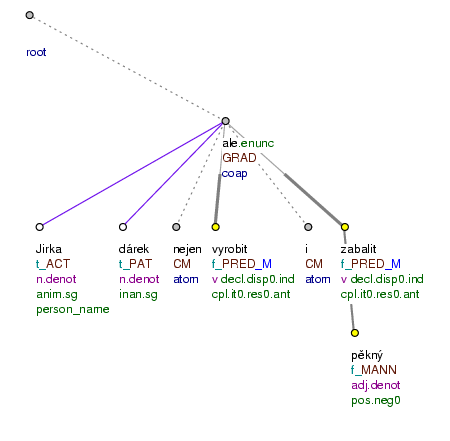
Jirka dárek nejen vyrobil, ale i pěkně zabalil. (=lit. George the_present not_only made, but also nicely wrapped.)
Figure 6.216. Ellipsis and the principle of shared modification in paratactic structures
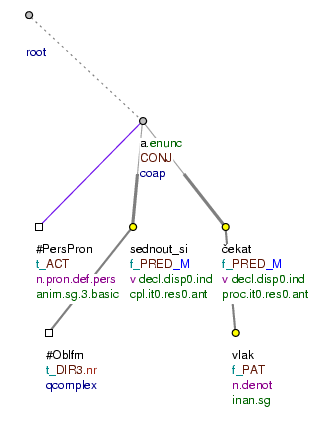
Sedl si a čekal na vlak. (=lit. (He) sat REFL and waited for the_train.)
Since there is the possibility to analyze the data in terms of shared modification (see Section 6.1.1, "Shared modifier of paratactically connected elements"), also textual ellipsis of non-obligatory modifications in paratactic structures is represented in the tectogrammatical trees.
In those cases when it is obvious from the meaning of the sentence that the dependent (optional) modification, present only once in the surface structure (with one of the conjuncts), modifies both elements in coordination, this optional modification is represented as a shared modifier.
This type of ellipsis is represented in the trees both with the clausal and constituent coordination (parataxis of clauses and sentence parts). With the constituent coordination, the shared modifier (the non-expressed modification, in fact) usually gets the RSTR functor (other functors are also possible). With clausal coordination, the shared modifier may be assigned a wide range of adjunct functors.
Cf.:
-
zlevněné šály a rukavice (=lit. reduced scarves and gloves)
= zlevněné šály a zlevněné rukavice. (=lit. reduced scarves and reduced gloves)
The free modification zlevněný (=reduced) is a shared modifier of the coordinated nouns šála (=scarf) and rukavice (=gloves).
-
nové knihy a časopisy (=lit. new books and magazines)
= nové knihy a nové časopisy. (=lit. new books and new magazines)
The free modification nový (=new) is a shared modifier of the coordinated nouns kniha (=book) and časopis (=magazine). Cf. Fig. 6.217.
-
hodný otec a dědeček (=lit. good grandfather and father)
= hodný otec a hodný dědeček (=lit. good father and good grandfather) (1 person).
The free modification hodný (=good) is a shared modifier of the coordinated nouns otec (=father) and dědeček (=grandfather).
-
Včera dal kytku Jirka Marii a také Milan Jiřině. (=lit. Yesterday gave flower George to_Mary and also Milan to_Henriette.)
= Včera dal kytku Jirka Marii a také dal včera kytku Milan Jiřině. (=lit. Yesterday gave flower George to_Mary and also gave yesterday flower Milan to_Henriette.)
The temporal adjunct včera (=yesterday) and the Patient kytka (=flower) are represented as shared modifiers of the coordination of the verbs dát (=to give) and dát (=to give). Cf. Fig. 6.219.
If it is not quite clear that the non-obligatory modification attached to one of the conjoined elements also modifies the other element (which is the more frequent case), this modification is not represented as a shared modifier (it is represented as modifying only the first conjunct). Cf.:
-
modrá šála a rukavice (=lit. blue scarf and gloves)
= modrá šála a rukavice (=lit. blue scarf and gloves) (the gloves do not have to be blue).
The free modification modrý (=blue) is not a shared modifier of the nouns šála (=scarf) and rukavice (=gloves). Cf. Fig. 6.218.
-
Kytku dal včera Jirka Marii a Milan Jiřině. (=lit. Flower gave yesterday George to_Mary and Milan to_Henriette.)
= Včera dal kytku Jirka Marii a Milan dal kytku Jiřině (=lit. Flower gave yesterday George to_Mary and Milan gave flower to_Henriette.) (it is not necessarily clear, that it was yesterday when Milan gave the flower to Jiřina).
The temporal free modification včera (=yesterday) is not represented as a shared modification. Only the Patient kytka (=flower) is represented as a shared modifier. Cf. Fig. 6.220.
It is always possible to represent the cases of textual ellipsis of non-obligatory modifications in terms of shared modification at the tectogrammatical level; therefore, it is not necessary to introduce of any new t-lemma substitutes for the omitted non-obligatory modifications.
Exception: In case there is a modification, which could potentially be represented as a shared modifier, but which has an argument role w.r.t. some of the conjuncts and an adjunct role w.r.t. other conjuncts, it is not possible to represent the modification as a shared modifier. Instead, new nodes (with appropriate functors) have to be inserted into the structure, one for each conjunct modified by the given modification. Then, it may happen that a non-obligatory modification is represented by a newly established node. Since there is no t-lemma substitute introduced for these cases, the inserted node is a copy of the expressed node.
Cf.:
-
prezident a zakladatel firmy (=lit. president and founder of_company)
= prezident firmy a zakladatel firmy (=lit. president of_company and founder of_company)
The modification firma (=company) cannot be represented as a shared modifier of the coordinated nouns, as the noun prezident (=president) requires an adjunct with the
APPfunctor, while the noun zakladatel (=founder) requires an argument with thePATfunctor. The node representing the noun firma (=company) will therefore be represented as a node with thePATfunctor and will depend only on the node for the noun zakladatel (=founder). A copy of the expressed noun firma (=company) will be inserted into the position of the modification with theAPPfunctor.Cf. the analysis of zakladatel a prezident firmy (=founder and president of_company) in Section 6.1.1, "Shared modifier of paratactically connected elements".
!!! This is only a temporary solution.
Figure 6.217. Textual ellipsis of a non-obligatory modification
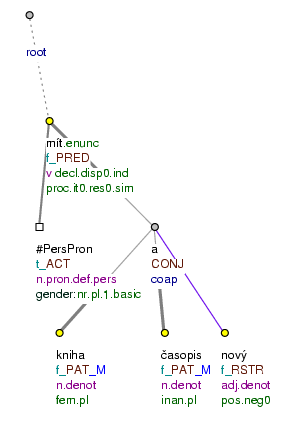
Máme nové knihy a časopisy. (=lit. (We) have new books and magazines.)
Figure 6.218. No ellipsis of a non-obligatory modification
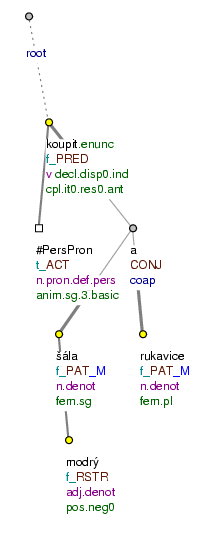
Koupil modrou šálu a rukavice. (=lit. (He) bought blue scarf and gloves.)
